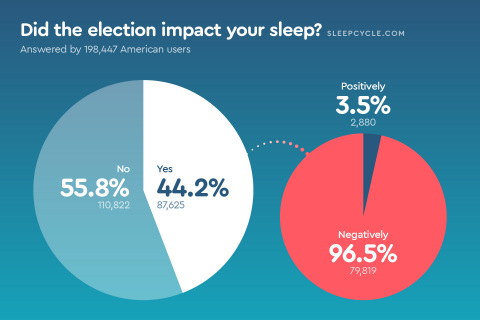If you lost sleep on election night, you’re not alone. Sleep Cycle, the world’s most popular intelligent alarm clock app that analyzes users’ sleep, today released a new report revealing how Americans’ sleep was impacted on election night. Using tracked sleep data and survey responses regarding election night, the report finds that of the 40% of survey participants who reported being impacted by the election, 96% were impacted negatively.
This press release features multimedia. View the full release here: https://www.businesswire.com/news/home/20201109005785/en/

Of the 40% of Sleep Cycle survey participants who reported being impacted by the election, 96% were impacted negatively. (Graphic: Business Wire)
2020 has been a year of unprecedented challenges. The Covid-19 pandemic and resulting economic downturn coupled with nationwide racial unrest and extreme political divisiveness has Americans stressed, and the election only compounded that. The “stressful day” sleep note, or factors contributing to that evening’s sleep, was used 54% more during Election Night compared to the mean of a regular Tuesday in October 2020.
“We all experience periods in our lives with increased tension, emotions or stress affecting our sleep,” said Frida Rångtell, PHD and Sleep Expert at Sleep Cycle. “For some, the time around election can be one such period. One or a few nights of sleep disruption every now and then isn’t the end of the world and we can usually recover rather quickly. We can prepare for stressful times and lack of sleep by doing what we can to regularly maintain healthy habits and bedtime routines. And we can make sure to allow ourselves adequate time for recovery afterwards.”
When comparing election night 2020 to 2016, Sleep Cycle found that Americans stayed up 26 minutes later in 2016 than they did in 2020. Similarly, the average bedtime on non-election nights was later in 2016 than in 2020. This year, as Americans tuned into the news on November 3rd to watch the returns, there was little expectation that a winner would be called that evening, the following day, or, even a few days later. Still, a shift in bedtime was seen across all age groups, especially for those aged 35-44 who went to bed 14 minutes later than they would on an average Tuesday in 2020.
The report includes data from Sleep Cycle users in the U.S. who voluntarily and anonymously shared their sleep data. It analyzes sleep session data from the last two presidential election nights, as well as a comparison of general day data, and in-app survey results gathered during the following time periods:
-
2020 Election
- 108,080 sleep sessions during the period of November 3‒4, 2020
- 198,447 users participated in an in-app survey on November 4, 2020
- General day data from the four Tuesdays prior to election night in 2020, totaling 472,178 sleep sessions
-
2016 Election
- 127,077 sleep sessions during the period of November 7‒8, 2016
- General day data from the four Tuesdays prior to election night in 2016, totaling 541,478 sleep sessions
To view the full report, or for more information Sleep Cycle, visit SleepCycle.com.
About Sleep Cycle
Sleep Cycle is the world’s most popular intelligent alarm clock app that analyzes users’ sleep, records findings and wakes them during their lightest sleep phase so they feel rested and refreshed. The app generates nightly sleep reports, tracks long-term sleep trends, and logs how daily activities impact sleep quality. With millions of users worldwide, Sleep Cycle has become the world’s richest repository of data on global sleep habits.
All Sleep Cycle sleep data used in this report is voluntarily shared anonymously by Sleep Cycle users. Sleep Cycle users can choose to decline or participate at any time. The data of users who decline participation is never shared or used for Sleep Cycle sleep research reports. User data remains safe and private, locally stored on the device, and in their online backup.
View source version on businesswire.com: https://www.businesswire.com/news/home/20201109005785/en/
